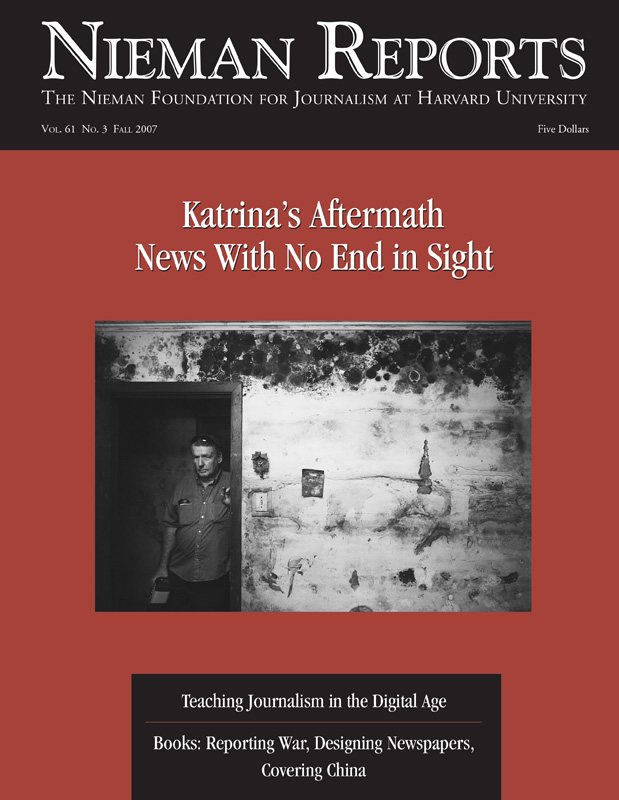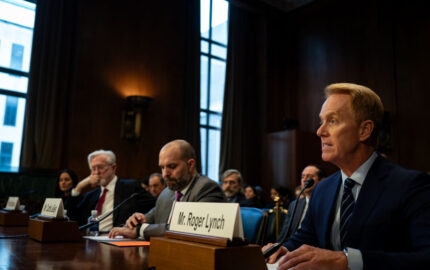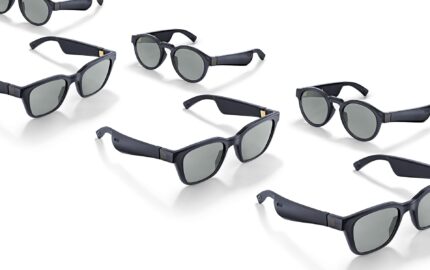In September 2009, Jeffrey Scheuer spoke at Brandeis University conference, "TMI (Too Much Information): Social Justice in the Age of Facebook," and shared his concerns about new media. You can watch his lecture here. Journalists, like scholars, formulate knowledge by knitting facts to contexts. They need analytic and critical as well as narrative skills and substantive knowledge. The intrinsically hybrid nature of journalism—its dependence on both concrete skills and broader academic knowledge—cannot be resolved in the abstract; subject knowledge and practical skills will always jointly affect the quality of reporting, just as they jointly affect the quality of teaching.
What, then, can journalists learn in an academic setting, and when and how should such study combine with or yield to the actual practice of journalism? The first question is the easier one: Journalists should study whatever brings depth and sophistication to their work; without begging the question, that could be almost anything. Some forms of journalism require generalists, others demand expertise; specialization or expertise is what university campuses best provide at the graduate level, just as they provide general breadth to undergraduates. Columbia’s master of arts program aims to do that through its four areas of concentration, but why limit it to those? Why not offer, for example, a journalism track with a concentration in Arabic and Middle Eastern studies, or environmental science, or public health—or anything else of journalistic relevance?
A vast range of academic subjects are potentially of such relevance—including history, politics, law, economics, business, sociology, psychology, the sciences, technology, urban planning, regional and language study. History is perhaps most relevant of all, especially to the generalist, given its intrinsic connections to journalism; but it doesn’t hurt to be a polymath. A master’s degree in any of these subjects would be more useful than a degree in journalism per se; better still, a master’s degree with a concentration in journalism, similar to existing joint-degree programs.
In addition to the many areas of possible specialization, there is a well-defined core of academic subjects that are directly relevant to all journalists. These include media history, law and ethics; media and society, or the interpenetrations of media and politics, and (especially) rigorous media criticism. Thus, it would seem logical to divide a journalist’s education into four parts or phases: undergraduate breadth in the liberal arts; graduate-level specialization; core media-related courses, and skills training.
Journalism education should be refocused to pursue two overlapping goals: first, and most important, to better prepare journalists to strive for excellence and second, instrumental to that, to encourage stronger bonds between journalists and universities. Refocusing, in this case, means both broadening and narrowing: broadening the basic conception of what journalism is, and how education can improve it and even blend with it, while providing more concentrated, specialized learning for individual journalists. Here are some suggestions:
Undergraduate journalism skills courses should be actively discouraged, because they displace more important learning. They should be replaced by campus journalism and professional internships.
Skills training should also be phased out of graduate journalism school curricula. Again, campus journalism and internships are the better option. (Stanford’s journalism department has moved in this direction.) Certain advanced courses, such as investigative and documentary journalism, should be retained, along with the core media courses (law, ethics, history, criticism, etc.), because they are important, fit naturally into an academic setting, and are difficult to replicate in the job environment. An interim measure would be to confine practical training to intensive short courses, preferably involving work at a news organization. The simulated-newsroom training that still predominates in j-school curricula could easily be condensed, leaving more time for core courses and specialization.
A third improvement (however implausible) would be to abolish journalism degrees. Such degrees (unlike those in law, medicine, architecture, etc.) do nothing for news consumers; they merely underscore the awkward and synthetic nature of journalism education. The academic degree system is unsuited to the differing and complex needs of modern journalists and is probably inappropriate to many other fields as well. It radically simplifies and distorts the extent and depth of study, and the level of actual accomplishment, and ignores the disparate needs of different students. The degree thus functions as a kind of credentializing tollbooth for career advancement and little else. Instead, master’s programs in the many fields relevant to journalism (as well as focused interdisciplinary programs) should be offered with journalism concentrations that involve actual reporting and collaboration between academic departments and news organizations.
More schools should implement the widely endorsed idea of offering short, focused seminars on the fellowship model for working journalists. The thrust of journalism education should shift to early and midcareer journalists. The diverse needs of recent college graduates, with and without campus journalism experience, and of journalists at various stages in their careers, require flexible programs of differing types and lengths—and cast further doubt on the value of granting degrees. As Orville Schell observes, “Journalism schools can … justify their existences by striving to become workshop-like places where older and more seasoned journalists team up with younger journalists to do actual projects that get published, aired or exhibited.”
All journalism schools should strive to be independent centers of criticism and debate about journalistic issues and society (for which the Internet is an excellent vehicle) and should incorporate that critical spirit into their curricula. Students should learn by critiquing the work of their peers and that of the professional media and should study the principles and history of media criticism.
Neither the practical (newsroom) model nor a purely academic one is ideal for either the aspiring or the working journalist. What is needed is a more dynamic fusion of the two models and one that is more flexible to the needs of particular individuals. Practical experience and intellectual knowledge both count toward excellence—along with curiosity, imagination and courage. The ideal journalist, in short, is both well rounded and an expert. He or she will have a critical and skeptical temper, an understanding of the legal and moral parameters of the journalism profession, and a clear sense of its history, civic function, and critical standards.
Given the barriers that exist at present, and which are exacerbated by the marketplace, it will require a paradigm shift to see journalism and education as tap-roots of the same democratic tree and part of an information environment cohabited by citizens, journalists and scholars. It will mean relaxing the boundaries, and perhaps the very definitions, of academic and journalistic institutions. But since knowledge abhors artificial boundaries, and cultural barriers only serve narrow constituencies, this will no doubt happen eventually.
RELATED WEB LINK
Carnegie-Knight Journalism Initiative
– carnegie.orgPerhaps the Carnegie-Knight Journalism Initiative, a three-year, six million dollar program begun in 2005 by the Carnegie Corporation of New York and the John S. and James L. Knight Foundation, can help to move journalism education in this general direction. This initiative, a joint venture with the Joan Shorenstein Center at Harvard and several leading journalism schools, is intended to “improve subject-matter education for journalists,” develop investigative reporting projects, promote research, and encourage curricular enrichment and team-teaching between journalism schools and host universities.
Finally, journalism schools can serve as laboratories for alternative models of both teaching and doing journalism—and alternative economic models—in keeping with Joseph Pulitzer’s vision of journalism as “one of the great and intellectual professions.” In the long run, there is great potential for synergy between j-schools, universities, foundations and research centers, with or without the help of traditional news organizations. They can produce knowledge that is timely, relevant and accessible to the public, but also free of commercial constraints and enriched by society’s deepest reservoirs of knowledge. That way points toward excellence.
Jeffrey Scheuer’s article is adapted from a chapter of his book “The Big Picture: Why Democracies Need Journalistic Excellence,” to be published by Routledge in the fall of 2007. He is also the author of “The Sound Bite Society,” published in 1999.



